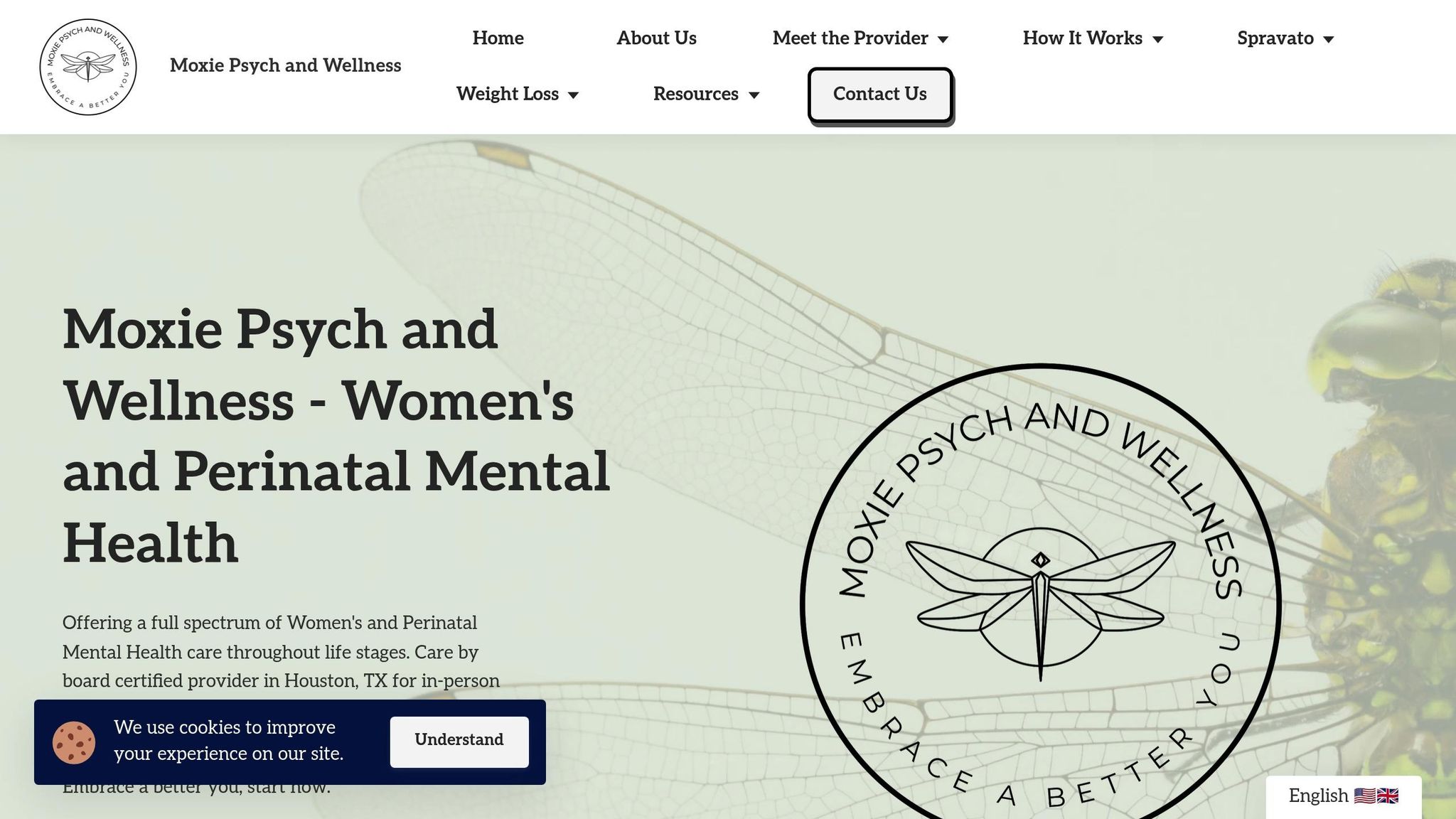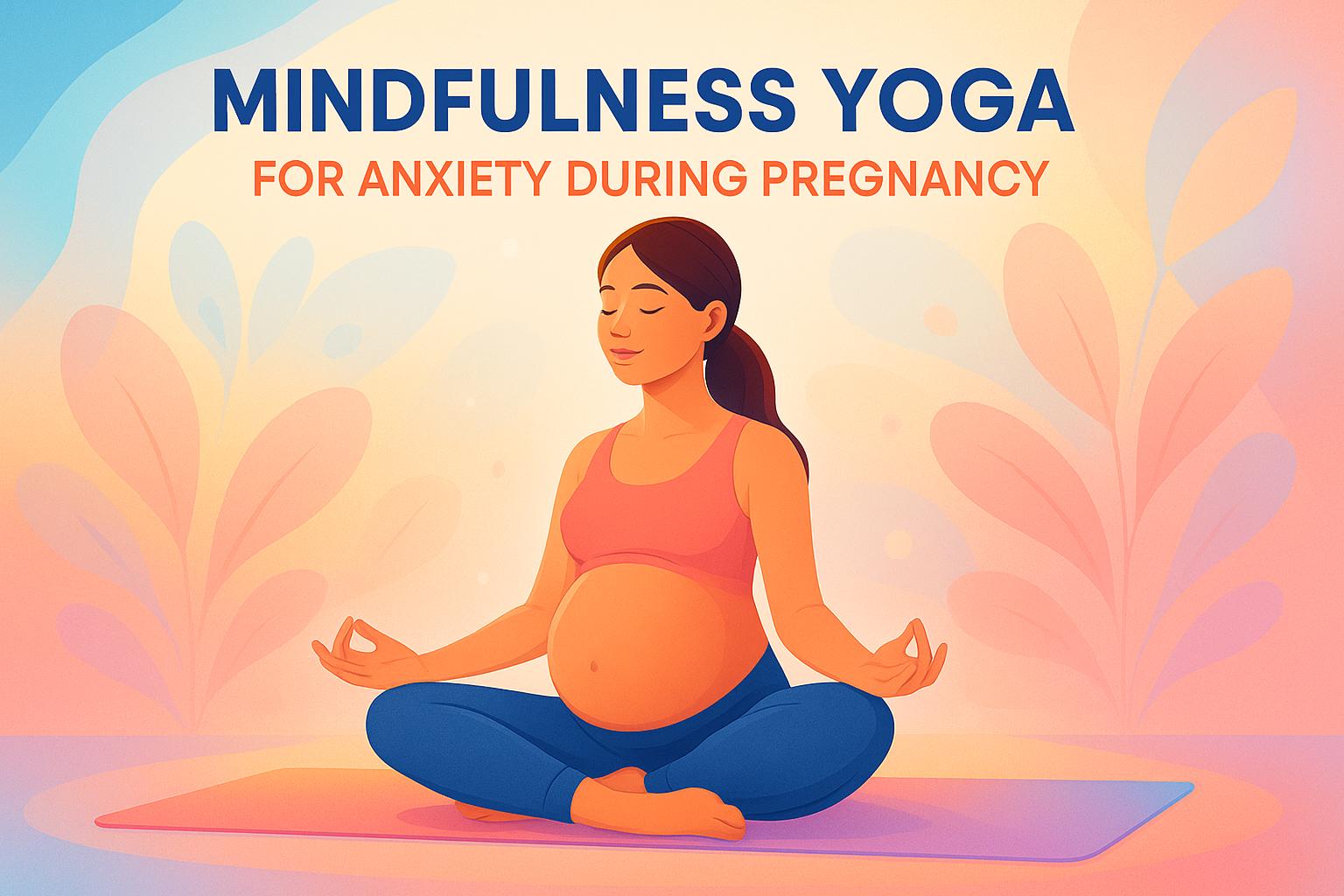Exercise during pregnancy can improve mental health and benefit your baby. Up to 20% of pregnant women experience depression, and 15% face anxiety, making mental health a major concern. Safe, moderate physical activity - like walking, swimming, or prenatal yoga - not only helps manage mood and stress but also supports fetal development. Studies show that regular exercise reduces depressive symptoms, regulates stress hormones, and even enhances a baby’s cognitive growth.
Key Points:
- Mental Health Impact: Exercise lowers depression and anxiety symptoms naturally, without medication risks.
- Baby’s Development: Active mothers may have children with stronger cognitive and motor skills.
- Safe Guidelines: Aim for 150 minutes of moderate exercise weekly, adjust routines by trimester, and avoid risky activities.
- Professional Support: Pairing exercise with mental health care, such as therapy, enhances overall well-being.
Staying active during pregnancy is a safe, effective way to support both mental and physical health. Always consult your healthcare provider to tailor your routine.
Pregnancy and Depression: how exercise can help!
Research Findings: Mental Health Benefits of Exercise During Pregnancy
Recent research highlights how exercise during pregnancy supports mental health for both the mother and baby. A meta-analysis from September 2024 reviewed seven studies involving 524 pregnant women and found that exercise significantly reduced antenatal depressive symptoms, with a medium effect size (SMD = -0.41) [2].
Lower Depression and Anxiety Symptoms
Structured exercise programs have been shown to meaningfully reduce depressive symptoms in pregnant women. The type and timing of exercise play a critical role - static exercises like yoga are particularly effective in addressing antenatal depression. Starting an exercise routine before the 20-week mark and maintaining it for over three months leads to better outcomes [2].
As Zhang, Liu, Sun, and Zhao explain:
"The amelioration of postpartum depressive symptoms not only contributes to improved infant growth, development, and behavior but also holds the potential for enduring positive effects." [2]
Exercise also helps manage stress, offering additional mental health benefits.
Better Stress Management and Mood
Physical activity has a stabilizing effect on mood by promoting the release of endorphins and regulating cortisol levels. These changes help pregnant women handle pregnancy-related stress more effectively. The mood-boosting effects often carry into the postpartum period, helping new mothers navigate the challenges of early motherhood with greater resilience.
Benefits for Mother and Baby Health
The advantages of exercise extend beyond mental health, positively impacting the baby as well. Research shows that children of active mothers are 1.51 times more likely to achieve higher scores on neurodevelopmental tests at 12 months. By 15 months, these children demonstrate stronger vocabulary skills, and by age 5, they score higher on cognitive assessments [1].
A Polish study involving 538 children further supports these findings. It revealed that children whose mothers engaged in at least 2.5 hours of moderate-intensity physical activity per week scored higher on verbal assessments. Their average psychomotor scores were 108, compared to 101 in the control group [1].
Dr. Gabriela Dellapiana, a Maternal-Fetal Medicine Physician at Cedars-Sinai, underscores the safety of exercise during pregnancy:
"Exercise is safe for most pregnant people, including groups who were traditionally recommended bedrest, such as people pregnant with twins." [3]
Additionally, a 2013 study of Canadian pregnant women found that moderate-intensity aerobic exercise (20 minutes, three times per week) led to measurable differences in newborn brain activity. EEG results showed improved sound discrimination and auditory memory, suggesting enhanced brain development that could support better language skills later in life.
These studies collectively show that regular exercise during pregnancy not only supports maternal mental health but also contributes to the baby’s cognitive and developmental growth, offering benefits that last well beyond birth.
Exercise Guidelines for Pregnant Women Based on Research
When it comes to exercising during pregnancy, having clear and safe recommendations is key. The 2019 Canadian Guideline for Physical Activity throughout Pregnancy stands out as a trusted resource, offering advice that balances the mental health benefits of exercise with safety for both mom and baby.
Basic Exercise Recommendations
Pregnant women are encouraged to aim for 150 minutes of moderate exercise per week. This can be split into sessions of about 30 minutes on most days.
Moderate-intensity exercise means working hard enough to feel slightly out of breath, but still able to carry on a conversation. This is often called the "talk test" - if you can chat comfortably, you're in the right zone.
Staying active during pregnancy has been shown to help reduce symptoms of depression and anxiety. For those who are not used to regular exercise, starting small - about 10–15 minutes of light activity three times a week - and gradually increasing the duration is a safe approach.
Safety Rules and Exercise Adjustments
As pregnancy progresses, your body changes, and so should your exercise routine. Following these modifications can help ensure safety and comfort.
When to Avoid Exercise Completely
Certain conditions make exercise unsafe during pregnancy. These include:
- Significant heart or lung disease
- Cervical incompetence
- High-risk multiple pregnancies
- Placenta previa after 28 weeks
- Preeclampsia or pregnancy-induced hypertension
- Persistent bleeding or other serious complications
Conditions Requiring Medical Clearance
Some situations call for a healthcare provider’s approval before starting or continuing an exercise routine. These include:
- Severe anemia
- Unexplained maternal cardiac arrhythmia
- Chronic bronchitis
- Poorly controlled type 1 diabetes or hypertension
- Extreme obesity or underweight
- Orthopedic limitations
- Poorly controlled seizure or thyroid disorders
- Intrauterine growth restriction
- Heavy smoking or a history of a sedentary lifestyle
Trimester-Specific Adjustments
Exercise modifications are necessary as the pregnancy progresses:
- First Trimester: Most women can continue their usual activities but should prioritize staying hydrated and avoiding overheating.
- Second Trimester: Avoid lying flat on your back after 16 weeks to prevent compressing the vena cava. Instead, try side-lying positions, use pillows or an exercise ball for support, or opt for standing exercises.
- Third Trimester: As your center of gravity shifts, avoid activities with a higher risk of falling. Reduce exercise intensity and be mindful of joint stability, as the hormone relaxin increases joint laxity.
Warning Signs to Stop Immediately
If you experience any of the following, stop exercising and seek medical attention right away:
- Vaginal bleeding or fluid leakage
- Dizziness, headache, or chest pain
- Unusual shortness of breath before exertion
- Muscle weakness affecting balance
- Calf pain or swelling
- Regular, painful contractions
Other Safety Tips
- Avoid exercising in hot, humid environments.
- Stay hydrated and maintain proper nutrition.
- Steer clear of contact sports, high-fall-risk activities, and scuba diving. These activities pose risks of abdominal trauma and other injuries.
Lastly, regular check-ups with your healthcare provider are essential. They can help tailor your exercise routine based on your unique needs and how both you and your baby are responding.
sbb-itb-3d00657
Exercise Types and Mental Health Benefits
Different types of exercise offer unique mental health advantages during pregnancy. Knowing which activities are most beneficial can help expectant mothers choose fitness routines that support both their physical and emotional well-being.
Cardio Exercises: Walking, Swimming, and Cycling
Cardio activities are excellent for boosting mood and reducing stress during pregnancy. These low-impact exercises release endorphins, which help combat depression and anxiety.
Walking is a simple yet effective way to stay active. It’s easy to adjust the pace and duration as pregnancy progresses, making it a flexible option. A 20-30 minute walk outdoors not only improves energy levels but also provides sunlight exposure, which aids vitamin D production and helps regulate mood.
Swimming is another fantastic choice. The buoyancy of water relieves pressure on joints and reduces physical discomfort, while the rhythmic strokes can have a calming, meditative effect. Many women find swimming to be both relaxing and energizing, making it a great way to ease anxiety.
Stationary cycling offers a safe and stable cardio option. It allows for consistent intensity levels, which can be maintained throughout most of pregnancy. This activity is particularly beneficial for improving sleep, which often becomes disrupted during pregnancy. Better sleep leads to improved emotional regulation and reduced irritability.
Mind-Body Activities: Yoga and Pilates
Yoga and Pilates combine movement with mindfulness, making them ideal for addressing both the physical and emotional changes of pregnancy.
Prenatal yoga emphasizes breathing techniques, gentle stretches, and modified poses that accommodate a growing belly. Deep breathing activates the parasympathetic nervous system, helping to reduce stress and promote relaxation. Meditation components in yoga further enhance mental clarity and stress management, while also preparing women for labor.
Group yoga classes offer an added benefit: connection. Sharing experiences with other pregnant women fosters a sense of community and reduces feelings of isolation. This support network can significantly improve emotional well-being.
Modified Pilates focuses on strengthening core muscles while improving body awareness and control. As women become more attuned to their changing bodies, they often feel more confident and capable. The precise movements and breathing patterns in Pilates also provide a mental escape from pregnancy-related worries, promoting a sense of calm.
Both yoga and Pilates teach relaxation techniques that can be invaluable during labor. Learning to manage pain through focused breathing and mental control builds confidence and reduces anxiety about childbirth.
Strength Training and Prenatal Classes
Light strength training is a great way to maintain muscle tone and boost self-esteem. Using resistance bands, light weights, or bodyweight exercises helps women feel physically strong, which often translates to improved body image and emotional well-being. The sense of accomplishment after a strength training session can also provide a mental lift.
Prenatal fitness classes combine various exercise types, offering a well-rounded approach to fitness. These classes often include elements of cardio, strength training, and flexibility work, all guided by instructors who provide safe modifications tailored to each trimester.
The group setting of these classes offers additional benefits. Exercising with others provides accountability and motivation, making it easier to stay consistent. Encouragement from instructors and fellow participants helps women stick to their routines, which is essential for long-term mental health benefits.
Specialized prenatal classes address the unique challenges of pregnancy, offering guidance and support that’s specific to this stage of life. The variety of activities keeps workouts interesting, reducing boredom and ensuring continued engagement. By staying active and connected, women can enjoy the mental health benefits of exercise throughout pregnancy, reinforcing the importance of tailored support during this transformative time.
Combining Exercise with Mental Health Care
Pairing exercise with professional mental health support can amplify the benefits for perinatal wellness. This combined approach addresses both physical and emotional needs, offering a well-rounded foundation for maternal mental health. Together, physical activity and clinical care create a powerful synergy that supports overall well-being during pregnancy.
Professional Mental Health Support
While exercise is beneficial, it’s not always enough for women facing moderate to severe mental health challenges during pregnancy, such as depression, anxiety, or ADHD. Professional mental health services play a crucial role in diagnosing and treating these conditions, offering targeted strategies that go beyond what physical activity alone can achieve.
When combined, exercise and clinical care can produce better outcomes. Physical activity helps by improving mood, reducing stress hormones, and promoting restful sleep. At the same time, professional treatment addresses underlying chemical imbalances and equips women with coping tools, making it easier to stick with an exercise routine and enjoy its mental health benefits.
Therapy sessions also provide a space for women to process emotional shifts and build the motivation needed to maintain regular physical activity. This combination ensures that the mental health benefits of exercise are maximized.
Moxie Psych and Wellness: Women's Mental Health Care

For a more personalized approach, Moxie Psych and Wellness specializes in women's and perinatal mental health, offering services that complement lifestyle changes like exercise. The practice provides in-person and virtual psychiatric evaluations, making care accessible for pregnant women, even if mobility or packed schedules are a concern.
Moxie Psych and Wellness emphasizes tailored treatment plans, ensuring that each woman’s exercise routine is integrated into her mental health strategy. This individualized care takes into account factors like specific mental health needs and the physical demands of pregnancy, recognizing that different types of activity may work better for different women.
The clinic’s flexible scheduling options are particularly helpful for pregnant women managing symptoms like fatigue or morning sickness. By allowing appointments to fit around exercise routines or peak energy times, Moxie Psych and Wellness helps women stay consistent in both their mental health care and physical activity.
Additionally, the practice offers specialized treatments for common pregnancy-related conditions, including depression, anxiety, mood disorders, and ADHD. This expertise ensures that women receive care grounded in evidence and tailored to the unique challenges of pregnancy and postpartum life.
For those requiring medication, Moxie Psych and Wellness provides medication management services to ensure that pharmaceutical treatments are both safe for pregnancy and effective in relieving symptoms. This professional oversight allows women to balance medication use with their exercise and wellness goals.
With a focus on personalized care, the clinic supports women in integrating exercise into their broader mental health plans. This holistic approach acknowledges that maintaining mental health during pregnancy involves addressing multiple factors, with professional care and regular physical activity working hand in hand.
Conclusion: Mental Health and Exercise During Pregnancy
Research consistently shows that exercise plays a key role in supporting mental health during pregnancy. It helps alleviate depression, anxiety, and stress while benefiting both the mother and the baby. Whether it’s a daily walk around the block or a calming prenatal yoga session, there are plenty of ways for expectant mothers to stay active and nurture their emotional well-being.
However, exercise is most effective when combined with a well-rounded approach to mental health care. For those experiencing moderate to severe mental health challenges, pairing physical activity with professional guidance can lead to even better outcomes for maternal health.
Safety should always come first when planning any exercise routine during pregnancy. Sticking to recommended guidelines, paying attention to your body’s signals, and consulting with healthcare providers are essential steps to ensure your routine supports your health and well-being.
Each pregnancy is a unique journey. By tailoring exercise plans and mental health care to individual needs - like the personalized support offered by Moxie Psych and Wellness - women can create a strong foundation for lasting health. This combination of movement and professional care ensures that both mother and baby thrive throughout the pregnancy and beyond.
Taking care of your mental health during pregnancy isn’t just about the present - it’s an investment in a healthier, brighter future. Whether through simple walks, prenatal yoga, or counseling, prioritizing emotional well-being benefits both you and your baby for years to come.
FAQs
How can I start exercising safely during pregnancy if I’m new to working out?
If you’re just starting out with exercise, it’s a good idea to take it slow and focus on low-impact activities like walking, swimming, or prenatal yoga. Start with short sessions - just 5 to 10 minutes a day - and gradually extend the time as your body adjusts. Pay close attention to how you feel, keep yourself hydrated, and avoid lying flat on your back once you’re past the first trimester.
Warming up before any workout is key to minimizing the risk of injury. And if you ever feel dizzy, short of breath, or experience any discomfort, stop immediately. Above all, check with your healthcare provider before beginning any new exercise routine to make sure it’s safe for both you and your baby.
What are the best exercises for improving mental health during pregnancy, and how can they benefit the baby?
Gentle exercises like yoga, walking, swimming, and stretching are great ways to support mental health during pregnancy. These activities can help ease stress, reduce anxiety, and alleviate symptoms of depression by naturally boosting endorphins and improving mood.
But it’s not just about the mom - regular moderate exercise during pregnancy may also benefit the baby. Research shows that staying active can encourage healthy brain development in the baby and support overall growth. Plus, it may help reduce the risk of certain pregnancy-related complications, making the journey healthier for both mom and baby.
What are the warning signs to stop exercising during pregnancy and call your doctor?
If you notice vaginal bleeding, painful contractions, dizziness, chest pain, shortness of breath, or calf pain or swelling while exercising during pregnancy, stop immediately and reach out to your healthcare provider. Other warning signs to watch for include a racing or irregular heartbeat, headache, or feeling faint.
These symptoms could point to possible complications, so it’s crucial to put your well-being and your baby’s safety first. When in doubt or if you have any concerns about your pregnancy exercise routine, always consult your doctor.



